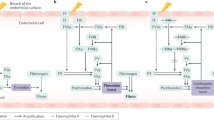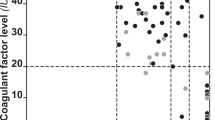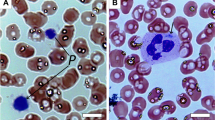Gene deletions in patients with haemophilia B and anti-factor IX antibodies (original) (raw)
- Letter
- Published: 12 May 1983
Nature volume 303, pages 181–182 (1983)Cite this article
- 164 Accesses
- 195 Citations
- Metrics details
Abstract
Christmas disease, or haemophilia B, is an inherited X-linked haemorrhagic disease which at present occurs in 798 known cases in the United Kingdom, corresponding to a frequency of about 1 in 30,000 males. Patients are deficient in the intrinsic clotting factor IX and are treated by replacement of this protein prepared from pooled plasma obtained from normal individuals. Occasionally treatment is complicated by the appearance of specific anti-factor IX antibodies. It seemed to us that this might be due to the absence of ‘self’ factor IX causing the immune system to regard the infused normal factor IX as foreign. The absence of all or part of the factor IX gene was an obvious possible reason for this, which we have now tested using our previously isolated gene probe1. We have found four patients with gross gene defects.
This is a preview of subscription content, access via your institution
Access options
Subscribe to this journal
Receive 51 print issues and online access
$199.00 per year
only $3.90 per issue
Buy this article
- Purchase on SpringerLink
- Instant access to full article PDF
Prices may be subject to local taxes which are calculated during checkout
Additional access options:
Similar content being viewed by others

Haemophilia
Article 24 June 2021


References
- Choo, K. H., Gould, K. G., Rees, D. J. G. & Brownlee, G. G. Nature 299, 178–180 (1982).
Article ADS CAS Google Scholar - Rizza, C. R. & Spooner, R. J. D. Br. med. J. 286, 929–933 (1983).
Article CAS Google Scholar - Southern, E. M. J. molec. Biol. 98, 503–517 (1975).
Article CAS Google Scholar - Shoulders, C. C. & Baralle, F. E. Nucleic Acids Res. 10, 4873–4882 (1982).
Article CAS Google Scholar - Seabright, M. Lancet ii, 971–972 (1971).
Article Google Scholar - Shapiro, S. S. & Holburn, R. in Haemophilia and New Haemorrhagic States (ed. Brinkhous, K. M.) (University of North Carolina Press, Chapel Hill, 1970).
Google Scholar - Shapiro, S. S. in Clinics in Haematology Vol. 8 (ed. Rizza, C. R.) 207–214 (Saunders, London, 1979).
Google Scholar - Maniatis, T., Fritsch, R. F. & Sambrook, J. (eds) Molecular Cloning: A Laboratory Manual (Cold Spring Harbor Laboratories, New York, 1982).
- Brownlee, G. G. & Choo, K. H. British Patent Application no. 8222486 (1982).
Google Scholar
Author information
Authors and Affiliations
- Sir William Dunn School of Pathology, University of Oxford, Oxford, OX1 3RE, UK
F. Giannelli, K. H. Choo, D. J. G. Rees & G. G. Brownlee - Genetics Laboratory, Department of Biochemistry, University of Oxford, Oxford, OX1 3QU, UK
Y. Boyd - Haemophilia Centre, Churchill Hospital, Oxford, OX3 7LJ, UK
C. R. Rizza - The Paediatric Research Unit, Guy's Hospital, London, SE1, UK
F. Giannelli
Authors
- F. Giannelli
You can also search for this author inPubMed Google Scholar - K. H. Choo
You can also search for this author inPubMed Google Scholar - D. J. G. Rees
You can also search for this author inPubMed Google Scholar - Y. Boyd
You can also search for this author inPubMed Google Scholar - C. R. Rizza
You can also search for this author inPubMed Google Scholar - G. G. Brownlee
You can also search for this author inPubMed Google Scholar
Rights and permissions
About this article
Cite this article
Giannelli, F., Choo, K., Rees, D. et al. Gene deletions in patients with haemophilia B and anti-factor IX antibodies.Nature 303, 181–182 (1983). https://doi.org/10.1038/303181a0
- Received: 04 March 1983
- Accepted: 28 March 1983
- Issue Date: 12 May 1983
- DOI: https://doi.org/10.1038/303181a0